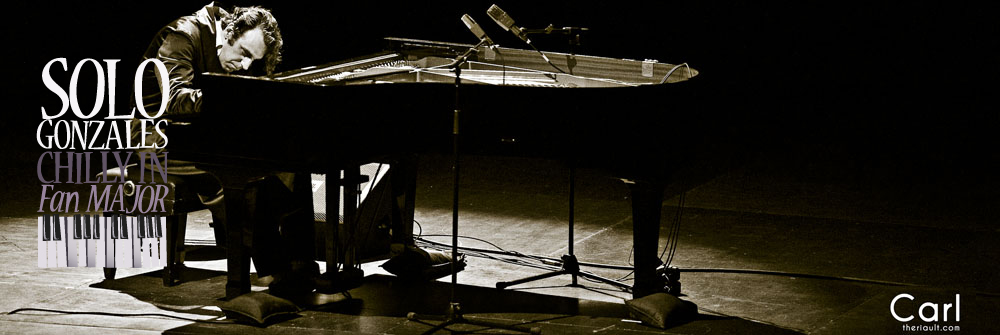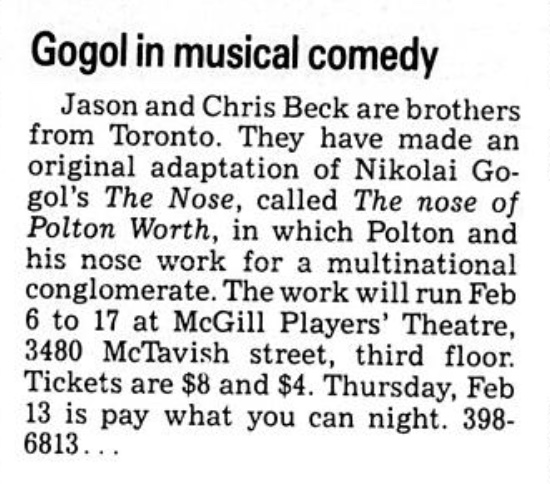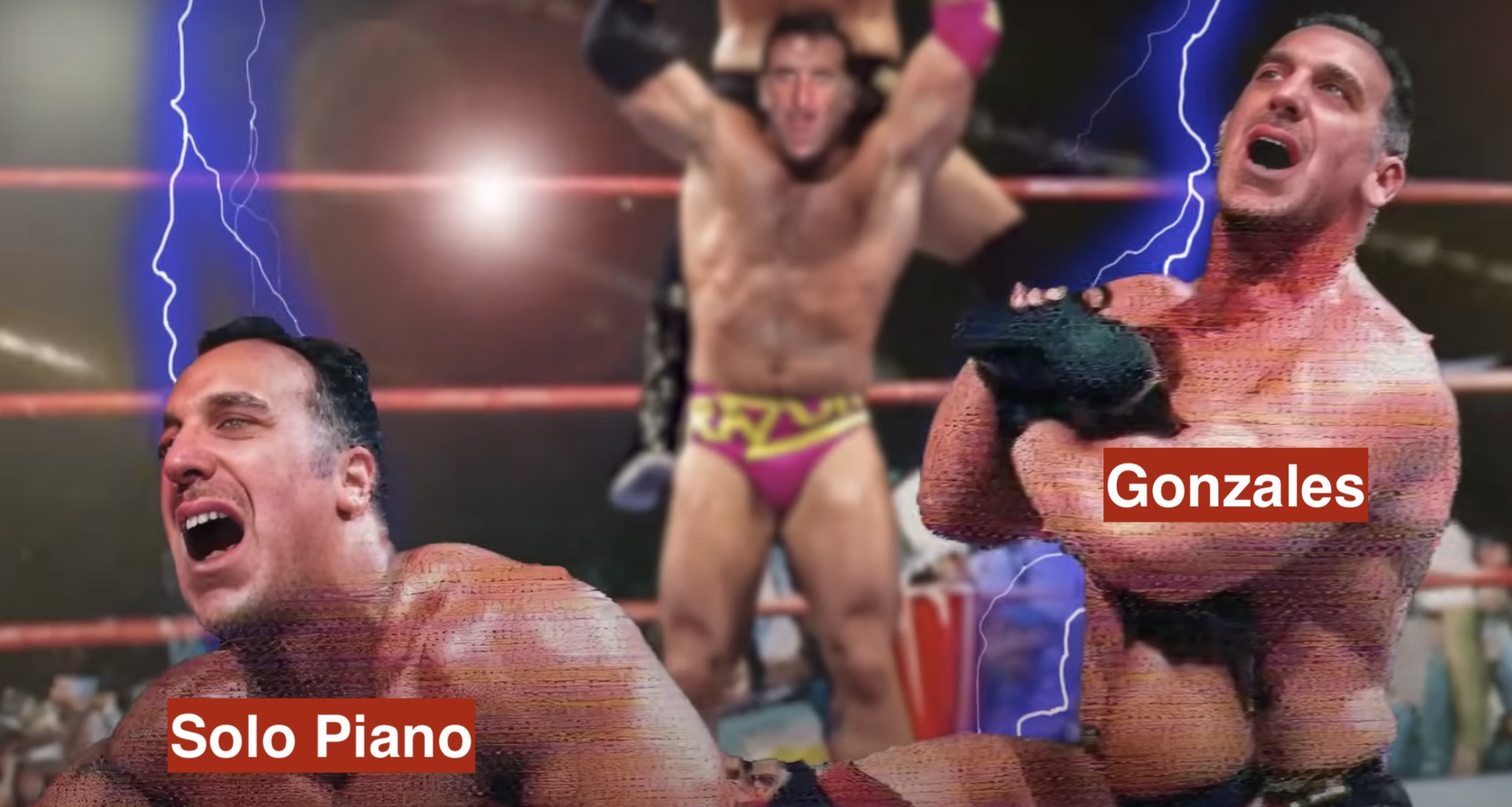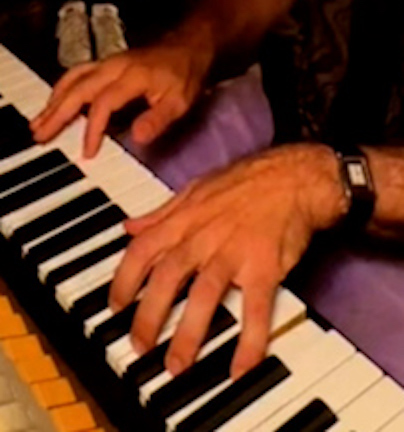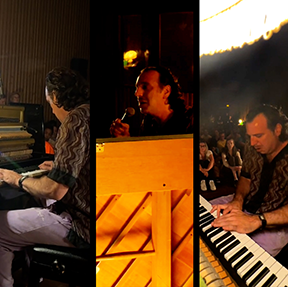 Amongst the deluge of Gonzales-related events lately that we’re busily writing about (Paralympics, single releases, forthcoming new album, concerts and so on), there was a fairly low-key milestone celebration that caught our attention as long-time fans: the 20th anniversary of Gonzales’ seminal Solo Piano album. In what appeared to be almost a « pop-up » performance, Gonzales returned to the sonic birthplace of Solo Piano: Studios Ferber in Eastern Paris on Rue Pierre Mouilliard (who was a pioneer in French aviation and is appropriate for a studio that has enabled many songs to take flight over the years). At the heart of Studios Ferber is Renaud Letang, who’s been engineering and producing for almost 35 years, and has a penchant for analog equipment from the 1970s. Renaud, who is a couple of years older than Gonzales may have met Gonzales in the early 2000s at the tail end of Gonzales’ relationship with the ill-fated German Kitty-Yo label. Somewhere between Take me to Broadway and Feist’s 1234, Gonzales and Letang found the time and inclination to record a few short piano pieces that appeared to be the ultimate confluence of Gonzales’ Jazz/Impressionistic roots, and more recent Indie Rock, Prankster Rap and synth-driven Electro releases. In an interview with Philippe Papineau of Montreal’s Le Devoir, Gonzales explained that Solo Piano gave him, « …a certain musical respect, » which has allowed him to continue to take chances knowing that his audience would follow him into whatever genre and sounds provides inspiration.
Amongst the deluge of Gonzales-related events lately that we’re busily writing about (Paralympics, single releases, forthcoming new album, concerts and so on), there was a fairly low-key milestone celebration that caught our attention as long-time fans: the 20th anniversary of Gonzales’ seminal Solo Piano album. In what appeared to be almost a « pop-up » performance, Gonzales returned to the sonic birthplace of Solo Piano: Studios Ferber in Eastern Paris on Rue Pierre Mouilliard (who was a pioneer in French aviation and is appropriate for a studio that has enabled many songs to take flight over the years). At the heart of Studios Ferber is Renaud Letang, who’s been engineering and producing for almost 35 years, and has a penchant for analog equipment from the 1970s. Renaud, who is a couple of years older than Gonzales may have met Gonzales in the early 2000s at the tail end of Gonzales’ relationship with the ill-fated German Kitty-Yo label. Somewhere between Take me to Broadway and Feist’s 1234, Gonzales and Letang found the time and inclination to record a few short piano pieces that appeared to be the ultimate confluence of Gonzales’ Jazz/Impressionistic roots, and more recent Indie Rock, Prankster Rap and synth-driven Electro releases. In an interview with Philippe Papineau of Montreal’s Le Devoir, Gonzales explained that Solo Piano gave him, « …a certain musical respect, » which has allowed him to continue to take chances knowing that his audience would follow him into whatever genre and sounds provides inspiration.
In this vein, Gonzales, being new to Paris and trying to realize a longtime goal of resurrecting a modern version of 60s French Pop with icons such as Francoise Hardy, Jane Birkin, and Charles Anvanzour, led him to Studios Ferber and Renaud Letang to collaborate with many talented artists, musicians and engineers. As Gonzales explained, Feist and others encouraged him to record his piano pieces that he privately recorded and demoed to only a select few. 20 years onward and Gonzales celebrates the recording that brought him to the forefront of musicians and the public in a private and intimate performance at Studios Ferber. Luckily, we were tipped off that there would be an accompanying livestream where he expanded on the story behind Solo Piano (transcript provided below). Being familiar with Gonzales and knowing many people who followed him through his time with his first band Son, we wondered if there’s more to the Solo Piano origin story than Gonzales’ brief explanation.
What’s a Nose Worth?
When we reach back in the Gonzales archives, the first musical milestone that relates to Solo Piano (excluding a reported high school battle of the bands vs. future mastering engineer Noah Mintz), is an entry in The Westmount Examiner, Thursday, February 1, 1990:
As Gonzales subsequently explained, he and his brother based the play on the current lifestyle of their father John, who is an executive at a Canadian company. Similar to Gogol’s original story, Polton ends up in a competition at work (at the fictional company Newton-Jones) with his own nose, which has separated from his body and is becoming more successful than Polton (and beating him at his own corporate aspirations). We can still hear a song from The Nose of Polton Worth, as Gonzales explains that the song, Decisions was originally composed for the play. Subsequent musicals such as Rumbletown (« a fantastical fun romp »), a jazz sextet-driven score for Isaac’s Fable – a student film by David Wechsler and Aaron Weingrad, A Difficult Stage musical with schoolmate Nick Carpenter, clarinet arrangements and bass choir performances while at McGill University, side gigs playing Jazz and other themed music for patrons for Andrews – an upscale clothing store in Toronto’s Yorkville neighbourhood, plus compositions, competitions and performances with longtime friend saxophonist Andrew Rathbun certainly honed Gonzales’ composition and piano chops. After Graduation, Gonzales seemed to eschew the piano again (the first time was apparently when he opted to play drums instead of piano while a young teen), to focus on Indie Rock, which was a popular genre in Canada in the 1990s. The end result was the group Son, where he enlisted the help of his McGill schoolmate David Szigeti – a.k.a. Taylor Savvy who was recently credited in Gonzales’ Poem video), plus Anthony Michelli, Simon Craig, and eventually Dominic Salole (Mocky). Son released two albums and had at least one cross-Canada tour in its relatively short lifetime, but most importantly, from Son stemmed The Shit with Merrill Nisker (Peaches), Rebecca Henderson (Sticky) and Mocky, then Peaches and Gonzales, and ultimately just « Chilly Gonzales ».
The Nose of Polton Worth is, retrospectively, a key element in Solo Piano – not just for the fact that it gave a teenaged Gonzales the confidence to write music destined for live performance, but because of the fundamental message of the story: through social attitudes and the power of illusion, your own creations can end up overshadowing you. For the character in Gogol’s story and Polton Worth, their nose ended up having more success than the character themselves, and with Gonzales, not only does the Gonzales persona achieve greater notoriety than Jason Beck, but Gonzales’ Solo Piano compositions achieve greater status than the Gonzales persona. Gonzales has explained that the perceived intimacy of his Solo Piano compositions is an illusion based on how they were recorded and how people perceive music, and in reality, they are modern pop songs delivered in a package that elicits emotion based on human evolution and physiological reactions to certain sounds.
In the same Le Devoir interview, Gonzales confesses that he also feels strongly about humour in music,
Onstage and in music videos, humour begins to take on much more importance, but in the Jewish sense of humour, it is humour which speaks to my own faults, which speaks to my own weaknesses, which is different from parody, which speaks of the weakness of others. For me, humour is something linked to danger, it is something serious.
Gonzo vs. Gonzales
That self-deprecating humour is apparent in Gonzales’ latest Open the Kimono video where we see Gonzales wrestling against a formidable opponent – himself. Besides demonstrating that Gonzales will look suave regardless of his hairstyle and facial hair, the memetic video speaks volumes when demonstrating that Gonzales’ only formidable foe is Gonzales. Although we’ll discuss the video along with the brilliant Barre-directed I.C.E. in future articles, the fact is that Gonzales seems to be imploring us to rise to the spirit of competition to better ourselves. If you don’t have an enemy (or grudge), make one up and set a target, as it’s far more effective to run faster when chasing something or being chased. When left to our own devices, we plod along without necessarily having the internal motivation to better ourselves. For Gonzales, long gone are the piano battles and formidable opponents (where are all the Tim Minchins and Andrew W.K.s?). His quest to engage in musical battles was also documented early as he explained to Stephen Dalton of the Ottawa Citizen in 2002:
I’m beginning to feel like the kid in a sandbox that nobody wants to play with…maybe I should set my sights on Jarvis Cocker or someone, pick on someone my own size.
Gonzales was also clairvoyant in an interview with Glen Harris of The McGill Daily Culture (a university paper) in April of 1993 and in a final concert review before leaving McGill written by Jonathan Goldman in March of 1994. In the articles, Gonzales’ aspirations were already apparent (and through some sort of serendipity, there was an article on the opposite page outlining how Wagner’s great-grandson Dr. Gottfried Wagner was ex-communicated from his family for criticizing Germany’s continued celebration of his anti-semitic great grandfather Richard):
So-called serious composers have made it their goal to create something ‘new’ at all costs. Any by consciously ignoring the stream of pop culture, they end up with museum pieces. I think many artists do their best work when reacting to their past work—either because it was a big flop or a huge success. I think the Beastie Boys are a really good example of that. After the first Rick Reubens album, everyone was expecting ‘Fight For Your Right to Party II’. The critics loved Paul’s Boutique, but no one bought it. I think it was a brilliant album…they had to reinvent themselves musically. Last time, I was trying to bring some kind of guitar aesthetic to the piano. I was tired of how the piano was relegated to elevator music over the last couple of years…What I ended up realizing was that a hammer-hitting string will never sound like a pick-plucking string. I realized that I don’t have to imitate a guitar to escape the [elevator music] stigma but to just be more creative on the piano. And I think that’s a lifelong project. I’ll be happy if I dent it in my life.
Gonzales made more than a few dents; he ended up writing off the entire vehicle, and the writer had the foresight to end the article with some sound advice, « Catch Beck before he gets too big. »
Musical Cocaine
The current Gonzales may be fighting an idealized version of himself as a lonely figure seated at the piano who captured the hearts and minds of millions 20 years ago. We’ve wondered if the Solo Piano figure in the figure-four leg lock will ever « come out on top » again. As we’ve come to experience, Gonzales has already answered most of our questions in his music. In Shut up and Play the Piano, Gonzales ponders the notion of becoming a « Solo Pianist »:
Solo Piano’s musical cocaine,
I tell myself, make another
don’t be so vain.
But imagine if I tossed one off -
imagine if the cock was soft,
imagine if I tarnished
the one and only album
that people really cared about
that would be a problem.
He’s obviously saying that he’s acutely aware that people want more and more Solo Piano – the emotional journey listeners experience is akin to cocaine, but he’s not a dealer, and his audience aren’t junkies. For Solo Piano to sustain maximum effectiveness, it needs to be pure and consumed in healthy doses to maintain maximum effectiveness. He’s already seen and dismissed a future where he’s « churning out » solo piano albums until people become numb. That doesn’t mean solo piano won’t feature in future Gonzales concerts or compositions/albums. As everyone who’s heard Gonzales’ live versions of Solo Piano compositions, they’ve all grown-up and have lives of their own – each embedding themselves in listeners’ minds at key life moments. In the livestream, people posted comments on what the songs meant to them, what they were doing and who they were with, and remembering enjoying the songs with someone who is not longer with them. In a sense, this is Gonzales’ Solo Piano compositions’ greatest feat – achieving time travel for anyone who associated a powerful memory with his music.
Those Solo Emotions
In his native Canada (although at this point, he has lived more of his life outside of Canada), Gonzales may recall a Toronto band called « Spoons » that had a local hit in 1983 with the Nile Rogers-produced song « Old Emotions », in which memories of a girlfriend vividly return from just a whiff of perfume, or a fun memory is elicited when feeling sand under your feet at a beach. The effect, often called Proustian memory, is vividly experienced by listeners to Gonzales’ music, and hearing his compositions brings back those memories and emotions – something which further entrenches Solo Piano songs as having their own ‘life’ outside of Gonzales. The songs themselves have essentially grown-up with Gonzales, and during the livestream, he explained that he would have changed the running order of the songs, and played them in the new and improved running order during the performance. Each composition has also ‘morphed’ from the original Solo Piano recording to what we hear today; a more bombastic Dot, an extended Manifesto, and so on. From the small sampling of livestream comments, Gonzales’ compositions have also inspired people to take up the piano and play Solo Piano songs in their own unique style (one comment indicated that, « No matter how hard I try, the songs don’t sound the same as when Gonzales plays them »). The « DNA » of Solo Piano will live on for centuries – much like how we enjoy Mozart, Brahms, Berlioz, Ravel and Shostakovich; all of whom Gonzales has cited as inspirations. When criticized for using AI for recent videos and album art, Gonzales took the criticism in stride indicating that (paraphrased) we’ve all been influenced by what we see and hear, and the art that we create is borne from an amalgam of other people’s creativity mixed with our own. Gonzales also added that he’s happy if people are inspired and influenced by his music and incorporate elements of his music into their own unique style. AI could theoretically compose a Gonzales-inspired Solo Piano IV, given enough training and input based on Gonzales’ music, life experiences and influences. Ultimately, it still wouldn’t be Gonzales, but he may appreciate the challenge of battling against his own AI.
Livestream Transcript
Back to Studios Ferber, Gonzales expanded on the Solo Piano origin story, providing additional insight on the studio, atmosphere, and piano that led to the creation of Solo Piano. He spoke in a mix of French and English, and some of the French parts were difficult to hear (e.g., « Mais aussi, sur le piano, c’est un peu comme un lechement de métallique. », which roughly translates to « But also, on the piano, it’s a bit like a metallic lick. »???), and were edited out.
[Applause]
Gonzales plays:
Gogol
Overnight
Manifesto
[Applause]
Thank you very much and good evening. Welcome to Studio Ferber. The Solo Piano album was recorded here and was an idea from Renaud Letang of the studio who liked my playing. And here, we’re doing something very intimate and specialized. But also, the story of this piano is that it was abandoned by a producer named Michel Curieux [spelling?], and Michel Curieux left the piano here, and I guess he had another one at home. It was just kind of in the corner of one of the smaller studios that was here. Now we’re in Studio A, there’s Studio B. Up there in is Studio C, we’re just imagining Studio D. This piano was in the studio D. And I was working in the studio A, but also the studio B with big artists like Jane Birkin, and Charles Aznavour. And I was just learning what it was like to really work in a professional studio environment, how to be diplomatic, be part of a team.
It wasn’t that easy for me because I was used to being an on-stage person. So sometimes I needed to just get away from the ‘royalty’ that was sometimes there with all the managers and diplomacy and the rules of conduct. And I just needed to get away somewhere, and the Studio D was more or less empty with just this piano there, but I would never have imagined that I would make an album of piano music there, because I was reacting against the idea of being an educated musician at the time. I thought, it’s not about your musical technique, it’s about your attitude. So, the piano was hidden in my music, but was never up front. But I was always composing on the piano, so, just like that, stress relief, I started to get it. And at the time I thought, I’m just writing some music that will become my next electro rap song, or maybe a collaboration with a singer like Leslie Feist, who I was also working with at the time. Or maybe I’ll send this to my producer friend Boys Noize and he’ll make an electronic banger out of it. I never thought that the piano by itself was enough. But over the course of months, several sessions, I decided to start recording, but it’s a stress relief session.
And pretty soon I started to fill up these tapes. And they were tapes, back then it was called DAT, digital audio tape. And I had a couple of microphones going straight into a DAT machine, no computer. And just started to fill it up and maybe eight months or 10 months later, I thought, maybe this is my next album. But very carefully, I was scared to release this music because I thought, I’ve already built up this reputation. Now I’m gonna do something so unexpected, it’s going to confuse people. I was afraid of confusing people and I started to play it to some trusted friends and musicians and everybody said, you have to release this music. And I thought, okay, I’m gonna give it a try. Everything changed when Solo Piano came out, and I never would have imagined to be sitting here playing this album for all of you tonight. So happy anniversary to Solo Piano and here’s to 20 more years of Solo Piano. Thank-you.
[Applause]
Another thing for those who know the album as an album. Some people prefer to pick and choose pieces of music from albums, I’m actually one of those people. Other people like to listen to the entire album. If you know the album by heart, I’ve taken some liberties with the running order tonight. With 20 years’ of recall, I see that I made some mistakes in the running order. Tonight there will be a change in of order. I’m going to play every song from the album and that is the only music that I’m going to play tonight is every song from Solo Piano. Once again, thank you for being here.
[Applause]
Gonzales plays:
Bermuda Triangle
Armellodie
Carnivalse
Dot
[Applause]
They asked me, is solo piano classical music? Is it jazz music? Is it pop music? I will tell you the secret for me of what I hope makes solo piano music for our time is that secretly, there is an invisible rap beat playing in my head whenever I compose these pieces. It’s a little bit difficult to explain how that would really change how I’m playing, but essentially in classical music, the idea is that rhythm is elastic, not really consistent.
And that’s why I would say my music is not classical music because I live in our time and our time is a time of metronomic music. We live for better or for worse in a world controlled by musical robots. And so I have my internal musical robot guiding me at all times. Jazz music likes to fill up the space as much as possible. Jazz music, I believe, tries to impress the audience rather than connect with them, with some exceptions, but that is the reason I don’t consider myself a jazz musician.
I’ve always thought this is music for the piano, but in the era of rap music. And so when the album came out, here and there a rapper would sample a few bars of solo piano and turn it into a rap song. And I thought, they hear it too. They hear the invisible rap beat playing underneath my piano. I think this reached its greatest climax in 2009. With a rapper, like me, from Canada. Can anyone guess who I’m talking about?
Drake. Yes, Drake. Or as you call him, Drake [spoken with a French accent]. Drake on his breakthrough mixtape in 2009 called So Far Gone sampled a song of mine. Well, I should actually correct myself. He didn’t sample the song. He took the entire song, all three minutes of it, and put it on his mixtape without singing or rapping on top of it. Which means it was just me playing the piano for three minutes, a song called The Tourist off of Solo Piano, except he called it Outro. And also, my name was not written anywhere. So you can imagine I was heartbroken on one side of things, and on the other side of things, very happy that this rapper, who was clearly going to be someone very huge, not only liked my music, but liked it enough to steal it. And by putting it on that mixtape, for me, I didn’t see it as a violation. My first thought wasn’t call my lawyer. My first thought was, let’s call Drake. Let me use this. Let me walk through the door that he’s opened by putting my song on his mixtape. And that’s what I ended up doing.
I ended up getting in contact with Drake, and we eventually performed together on a Canadian television show, and then ended up in the studio that evening, and I ended up contributing to Marvin’s Room and a whole bunch of other classic Drake songs. And the relationship has kind of continued until this day, and that was a real high point. And in 2019, Drake decided to clear this famous breakthrough mixtape of his. By clearing it, this time he was gonna give everybody a chance to react to him using their music, and perhaps get paid or get some credit. And so I said, I don’t care about getting paid, I just want my credit this time. And so in 2019, the 10-year anniversary of his So Far Gone mixtape, it was released on all of the streaming platforms. And instead of just saying Outro, this time it said, Outro (featuring Chilly Gonzales). And I thought, how the hell am I featuring on my own fucking song?
Well, it’s not really called Outro, it’s called The Tourist, and I’m about to play it.
[Applause]
The Tourist
Salon Saloon
Meischeid
Paristocrats
[Applause]
Something like this album and what it’s been able to mean to people over these 20 years is not possible alone. The first one I have to thank is Renaud Letang. I think he’s either in this room or probably in the booth hiding. Renaud is a mentor, he’s a mentor to me, he’s obviously a producer, a mixer, engineer, but more than that, he’s the chef, he’s the one I trust, artistically speaking, to push me further.
[End of livestream]
The Magician
Viewing and listening to the livestream was an unexpected and welcome surprise. Seeing Gonzales glide over the keyboard and produce ethereal music is reminiscent of a magician who performs tricks with cameras up-close; we can clearly see his hands and fingers moving, but are unable to mentally align those movements with what we’re hearing. We just have to suspend our belief for the time being and let the music wash over us.
There’s an old recording that used to be available on the CBC (Canadian Broadcasting Corporation) website of a Solo Piano concert from Glenn Gould Studio in Toronto. During Gonzales’ performance, he stops after a playing a few bars of Carnivalse (which was eventually included in the Royal Conservatory of Music’s repertoire) and asks the audience if they prefer when he « raps » or « plays solo piano ». The applause « meter » ends slightly in favour of more solo piano, so representatives are selected from the audience – one for solo piano and one for rap. The rap delegate makes a convincing argument that the combination of piano and rap is more interesting than just piano alone, while the piano playing representative argues that the piano-playing Gonzales is better, « Because your mother told me you were. » (Gonzales’ mother was in the audience). Ultimately, Gonzales says that the piano playing delegate had a convincing argument adding, « then again, I never do what my mother wants me to do, » and proceeds to dive into Decisions. The « decision » for Gonzales to follow his musical intuition has worked well, and despite being concerned about shifting from a Indie Rocker to a Prankster Rapper, to a Piano-Playing Genius, to a 70s Crooner to an Electronic Dance Musician to an Orchestral Rapper to a Concept album piano-player to a Multilingual Rapper to anything else, his audience has been enthusiastically along for the ride, since they know Gonzales is always there to move us through life, after all, « you snooze, you lose. »
Happy 20th anniversary Solo Piano – here’s to hundreds more.
